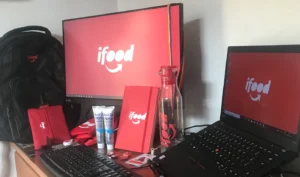Mona Oliveira is the founder and co-CEO of BioLinker, a startup biotechnology which develops recombinant proteins using its own methodology. A business idea thought up by a Brazilian, from the Northeast, who dedicated years to her scientific career while balancing her studies with motherhood.
“I usually introduce myself as a mother, a scientist and, finally, the third thing I have become in recent years: an entrepreneur”, says Mona in an interview with iFood News.
It is not possible to separate motherhood from the career of this enterprising scientist. She began her studies as a single mother to her first daughter, Lana, and came up with the business idea for BioLinker when she was on maternity leave with her second son, Dario, born in Slovenia, where he completed his doctorate in nanotechnology.
Recently, BioLinker received an investment from Fabricio Bloisi, president of iFood, to expand the development and production capacity of the company's new headquarters, in Cotia (SP). Bloisi was one of the mentors in monitoring the growth and management of the synthetic biology company and is now a partner and member of the administrative board.
In the following interview, the co-CEO of BioLinker — she shares the role with her husband, Sandi Ravbar — talks about the importance of biotechnology for improving our quality of life and the production system and why they decided to undertake the path of New Economy.
What does BioLinker do?
BioLinker is a company focused on developing recombinant proteins and, with our own methodology, we can accelerate the production of these proteins by more than 100 times. It is something extremely difficult to produce and with a high risk rate. It is in this pain that we work.
What are these proteins and what is their importance?
When we talk about proteins, those who don't know it immediately think of whey protein. We really hear this a lot. But proteins are part of several markets and it's really cool for minds like mine, who like new things. Every week we can work with a product from a completely different market.
Antibodies used in treatment or for diagnosis, enzymes that degrade sugar cane to make ethanol, bioactives, all of these are proteins. There are proteins that move US$ 1 trillion. We have an infinite number of proteins in the most diverse organisms, some of which we still don't even know what they are for. In the research area, I have an infinite number of possibilities. And more and more we will want to understand this.
BioLinker is a Brazilian startup 100%. Why did you decide to be a new economy company?
As a startup, we propose a completely new business model. There is no company that develops recombinant proteins using this technology and offering the same services as BioLinker. It is a semi-automated system, which we technically call a “system in vitro production of recombinant proteins”. Today we work on producing these proteins in a scalable way. At the research and development level it is possible to do so, but at the industrial level there are a series of challenges. This is where we are planting our flag.
And today do you serve the industry?
We are already able to work with industrial scales, which have a smaller number of orders, but with a high average ticket, but we have not stopped attending to research, which has a larger number of orders, but on a small scale. These are the two customer profiles that BioLinker serves. But that was like a survival strategy. Fabricio Bloisi said something interesting about this, comparing our moment with when he started in the business of software. He said that as companies did not receive investment, they did everything because they needed to survive. He observed the same thing when he saw that we serve all these segments [health, pharmaceutical, food and agriculture]: “you do this because you don't receive investment so you can focus on just one”. We are now at this stage of deciding among our client portfolio which ones will receive greater focus from the company and where we will operate best.
Have you always wanted to undertake?
I came from a family of entrepreneurs, traders. They were successful, but they also saw business ruin. So, in my memory, entrepreneurship had both the side of success and failure. So, for family reasons I guided my career, for the sake of survival, of having a job and not being work. I never liked thinking “I’m going to take a risk and if everything goes wrong, what the hell, I’ll go back to my mother’s house”. But I think that in the end, I always had this spark for wanting risks, for thinking I could do it, for new things. I always had the concern of wanting to build with my discoveries, with what I developed in a laboratory. I wanted to impact several people's lives. I think I just postponed this dream a little until when I was able to take a chance.
What is the stage of biotechnology in Brazil and where can it go?
Today we can understand biotechnology as a solution to production problems. In synthetic biology, which is a segment of biotechnology and the field in which we operate, we kind of use the intelligence of nature. A hypothetical example: a frog in Colombia that produces a substance in its skin that is antimicrobial. This is an intelligence created by nature through evolution and we can take that genetic code, carry out a genetic manipulation process in the laboratory and produce this benefit without having to kill the frog. It is a green production process in which you have something identical to what nature already offers, but without harming it.
There are other startups that manipulate organisms to capture carbon from the atmosphere, to produce petroleum substrates, to degrade plastic, all of this to create more sustainable ways for us to maintain the economy while being in harmony with the Earth, which talks about with the ESG theme and all the other policies that the world has been creating. Only biotechnology will help with this.


